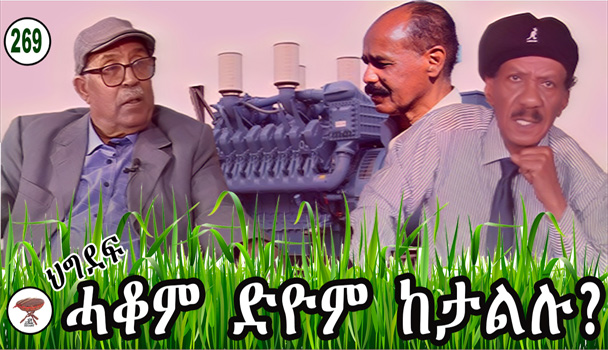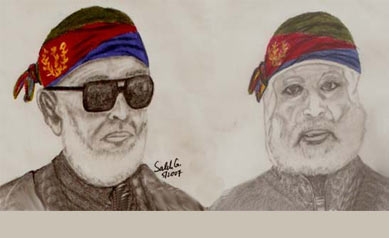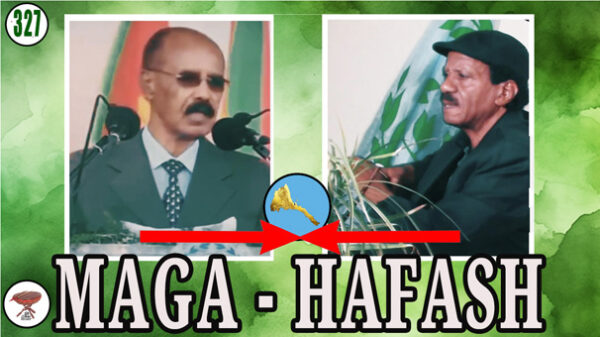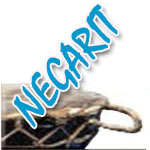Is PFDJ Honest or It’s a Gimmick?
“Farmers work the land; Merchants trade in the market (freely).” That profound
saying is attributed to the first proclamation the Italian colonization government issued when it established itself in Massawa. Eritreans accepted that wholeheartedly, though it was issued by their colonizers. Sadly, they are denied that freedom by those who supposedly freed them, and that is still the major disappointment they face after independence.
Recently, Saleh Younis wrote that the Eritrean demand for change is “not because of the TPLF. Not because of America. But because Isaias is approaching 80.” He further wrote, “It should not be taboo to ask, What’s the Transition Plan?”
Slowly, silenced Eritreans are beginning to break the taboo and speak out. It’s like what happened in the aftermath of the Badme war of 1998–2000. However, PFDJ and its cadres chocked the nescient free press and silenced it—a silence that has lasted more than two-decades. Will the second attempt at breathing freedom be chocked or it will flourish? There are many views on the situation, its causes and what might happen next.
It’s time the PFDJ yielded to the public’s demands for change.
1. The upper echelon is anxious because the social and political situation is untenable, and the volume of their chatter is increasing.
The average age of the PFDJ leadership is extremely high, with the president close to 80. So many of his old colleagues are dropping dead regularly.
2. The army is exerting pressure to see change; the young believe their chances of advancing will stay blocked until a proper system of retirement is introduced to clear the way for a smooth transition.
Many years ago, the PFDJ promoted a handful of young cadres to senior positions, but since the transition was ill-intentioned, many of the promoted cadres are now languishing in exile.
3. The business community is apprehensive about the wasted opportunities, the command economy, and the monopoly of almost all sectors by the ruling party that has crippled the Eritrean economy.
The PFDJ has set the development bar so low that mediocre investments by the regime are promoted as a major transformation of the economy, and many are disgusted at that.
4. Eritrea mainly depends on small oil-based generators with weak or non-existent distribution lines. Gas is not readily available to run household generators, which most cannot afford. Worse, the PFDJ development bar is so low, driven by the self-reliance mantra.
Recently, the PFDJ imported a small power plant estimated to cost around $150,000, and it was promoted as if Eritrea’s power requirement had been met. But it’s a meagre investment that doesn’t solve even a small fraction of Eritrea’s power needs; it is not so for the state media and its affiliate propagandists, who were celebrating the arrival of the generator. That explains the low bar on which the PFDJ’s economic ambition is measured.
Deceiving the people by exaggerating and highlighting less than humble endeavors (such as patching an asphalt layer in a street) and splashing it all over the news like a grand achievement, is the norm.
The Eritrean business community, whether investing in or located in many African countries and elsewhere, is so disappointed. Investing in other countries when Eritrea is in dire need of investment and has huge potential is not by choice. However, a few businesspeople are flourishing elsewhere, not in their own country. Ironically, even the PFDJ has heavy investments in other countries, not Eritrea. It has perfected how to camouflage its investments by using other people as a façade. In Eritrea, the government prefers to celebrate mediocre investments. If given the chance, a single business entity could import ten generators, equaling the much-celebrated power plant. Alas, when the bar is set so low, grain grinding machines become a reason for national celebration and accolades.
Many Eritreans foresaw the many risks that Eritrea is facing now, including the mismanaged economic and social policies, the political situation, and the issue of justice and freedom that holds Eritrea back. The problems have become such a burden that the PFDJ cannot zip the people anymore.
Given the PFDJ’s historical attitude, it’s logical to ask why the PFDJ is showing little tolerance of voices. It doesn’t mean there was no hushed discourse expressing misgivings, or even shy dissent. But now it is slowly coming out to the open—it feels like the post G15 arrests of twenty-something years ago, when the Diaspora was more connected with people inside Eritrea and discussed many national issues. But suddenly, the security regime got tighter. The few active ones left Eritrea, got sick, or died. Thereafter, even the benign opposition movements were quashed and forced into silence.
Regardless, the loosening of the security grip is a welcome development. Eritreans, particularly those inside Eritrea, must be bolder and more assertive. A nation cannot be held hostage to the interests of a few who have been in control with little to show for it. The recent intellectual space allowed in Eritrea has motivated a few (very few).
Last month, Alemseghed Tesfai, a famous author and historian, expressed his views in a lecture in Keren. Some say it’s an old lecture that PFDJ allowed to air after much delay. But it doesn’t matter a lot. That kind of lecture wouldn’t have been tolerated twenty years ago; Alemseghed would have ended up in prison.
A few weeks ago, a YouTube channel interviewed Brigadier General Abrahaley Kifle . So far, the interview has been published in 15 episodes and is still going on. His narration is captivating and brilliantly sequenced. Even those who are familiar with the events he is narrating are consumed, as if they didn’t live through the events.
I wish the interviewer and the interviewee covered the Keren teachers’, and the G15’s arrest stories.
Message to the Bigots
What’s religion in simple terms? Religion is a faith and arguing about its doctrines, principles, and tenets doesn’t take one anywhere. Many understand that religion is supposed to humble believers, help them lead a virtuous life, and teach them to be good and righteous people. On the other hand, it discourages believers from gossiping, backbiting, and spreading lies. False witnesses are scoffed at by true believers. Don’t you think ignorance must be considered a sin, particularly when knowledge can be easily obtained?
Bigots do not appreciate civil discourse and dialogue; they are “obsessed with extracting a fatty morsel from a fly (kab hamema Hekhle)”. They reject the values that unite compatriots, let alone humanity. They focus on nitty-gritty anecdotes to demolish any move towards harmony and stability.
Included in the above linked Tigrigna audio-visual version of this topic is a video clip comparing Muslim and Tewahdo Christian prayer rituals. They are almost the same except for some subtle and negligible mechanical variation. Here, it’s important to recognize the intention; the moves, bowing, and postulating are for the God they both believe in: Allahu Ahad, Ahadu Amlak. One Almighty God, not an almighty dictator or a sectarian god.
Before I conclude, I implore you to confront every divisive and primitive politicization. Challenge and engage the bigots, and don’t allow the hate campaign to spread. No country should be a playground for novice, racist politicians. No one should accept the indecency, the open assault, and the sowing of seeds of religious and ethnic strife in any country. That is where all citizens worth their salt should come together—of course citizens do not see each other eye to eye when it comes to dictatorships like the PFDJ governance, and brutality, that are crippling the social, political, and economic lives of many people. Every noble citizen must embark on taking the divisive nuisance seriously and shun the propaganda, the racism, and the mediocrity in all their forms.





Awate Forum